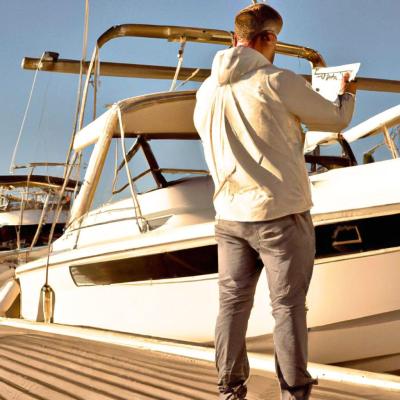Understanding Your Needs and Preferences
When selecting a boat, it’s important to consider a range of factors that will help you pinpoint the type of boat that best aligns with your needs and preferences. Some key factors to keep in mind include:
- Boat Type and Purpose: Do you plan to use your boat for fishing, pleasure cruising, watersports, or some combination of the above?
- Size and Capacity: How many people do you typically want to accommodate onboard, and how much space do you need for gear and supplies?
- Condition and Age: Are you willing to invest in a brand-new boat, or are you open to considering used options?
- Features and Amenities: What types of features and amenities are important to you, such as a galley, sleeping quarters, or a sound system?
- Power and Fuel Efficiency: Will you be using your boat for short day trips, extended voyages, or something in between?
- Trailering and Transport: Are you planning to store or transport your boat using a trailer, and if so, what are the specific requirements for your towing vehicle and storage location?
Evaluating Your Budget
When it comes to buying a boat, there are a number of important factors to consider in relation to your budget. Understanding these costs upfront will help you make an informed decision about what type of boat is right for you. Some of the key considerations include:
New vs. Used Boats
Brand new boats might be tempting, but they come with a hefty price tag. Used boats, on the other hand, can save you a lot of money but may require more maintenance and upkeep due to wear and tear. Before deciding whether to buy new or used, consider your budget and what kind of boat you need.
Financing Options
Financing is a popular way to cover the costs of buying a boat, especially for those who don't have the cash upfront. There are a few different financing options to consider, such as boat loans from a bank, credit union, or financing company, or using a home equity loan or line of credit to finance the purchase.
Operating Costs and Expenses
Boats are not cheap to operate, and fuel, maintenance, docking fees, and other expenses can add up quickly. Before making a purchase, think about the annual operating expenses you can expect to pay, and factor these costs into your overall budget.
Insurance and Registration
Just like a car, boats must be registered with the state in which they are operated. Registration fees and requirements vary by state, so make sure you research this beforehand. Additionally, insurance coverage for boats typically includes liability coverage, damage to the vessel, and coverage for passengers.
Storage and Maintenance
Storing a boat can be expensive if you don't have space on your property, and marina fees can add up quickly. Additionally, boats require regular maintenance and upkeep to keep them in good condition and functioning properly. Consider these costs when creating your overall budget for boat ownership.
Choosing the Right Boat for Your Needs and Budget
Researching and Comparing Different Models
Choosing the right boat for your needs requires careful consideration of various factors such as size, features, and budget. Before making any decisions, it is important to research and compare different boat models to determine which one best fits your needs.
You can start by browsing through online boat listings, visiting boat shows, and talking to friends or family members who own boats. Look for boats that match your intended use, such as fishing, cruising, or water sports. You should also consider the size of the boat, the number of passengers it can carry, and the type of engine it comes with.
Once you have a list of potential boats, make a side-by-side comparison of their specifications, prices, and warranties. This will help you narrow down your options and determine which boat offers the best value for your money.
Consulting with Trusted Dealers and Brokers
After choosing several boats that meet your needs, consult with trusted boat dealers and brokers. These professionals have extensive knowledge of different boat models and can provide valuable insights and advice.
During your consultation, be open and honest about your budget and needs. Ask for their opinion on which boat would best meet your requirements and budget. They can also provide information on financing options, insurance, and maintenance needs.
Be sure to work with reputable boat dealers and brokers who are licensed, bonded, and insured. You can check online reviews and ratings or ask for references to verify their legitimacy.
Taking Advantage of Test Drives and Demonstrations
Before finalizing your decision, take advantage of test drives and demonstrations. This is important to assess whether the boat is a good fit for you and to familiarize yourself with its features and functionality.
During the test drive, pay attention to how the boat handles, its maneuverability, speed, and stability in different conditions. Test all the features and systems, including the navigation, electronics, and plumbing. This will help you determine if the boat meets your expectations and needs.
Negotiating and Finalizing the Sale
Once you have selected the right boat, negotiate the price and finalize the sale. Be sure to carefully read and understand the terms and conditions of the contract, including any warranties or guarantees.
Check for any hidden fees or charges and negotiate them if necessary. Consider purchasing extended warranties or insurance to protect your investment.
Preparing for Delivery and Use
After finalizing your purchase, prepare for delivery and use. Make arrangements for transportation and storage.
It is also important to familiarize yourself with the boat's safety equipment and to complete any required training or certification. This will help you avoid accidents and ensure safe and enjoyable use of your boat for years to come.
Tips and Advice for First-Time Boat Buyers
If you're a first-time boat buyer, it can be overwhelming to navigate the different options and features available. Here are some tips and advice to consider:
Getting Educated and Trained
Before purchasing your first boat, it's important to obtain a boating education and training. This will not only ensure your safety but also those around you. Check with your local boating authority for courses and certifications offered.
Building a Safety Plan and Checklist
Safety should always be top of mind when out on the water. Create a safety plan and checklist to follow before starting your boating adventures. This should include safety equipment needed, emergency procedures, and weather check before heading out.
Networking with Other Boaters and Local Resources
Connect with other boaters in your area and local resources to learn and gather information about boating. This could include local boat clubs, marinas, and community events. These connections can also be helpful when needing advice or recommendations for maintenance and repairs.
Making the Most of Your Boating Experience
Boating is not just a pastime, but a lifestyle. Make the most of your boating experience by discovering new destinations, trying new activities such as fishing or watersports, and creating memories with your loved ones. Remember to always have fun and enjoy the journey.
Conclusion
Choosing the right boat can be overwhelming, but by assessing your needs and budget, researching different types of boats, and inspecting boats thoroughly before making your final decision, you can ensure a smooth and enjoyable boating experience.
Remember to consider factors such as your experience level, the size and type of water you plan to navigate, and the maintenance and operating costs of the boat. Take your time, ask questions, and seek advice from experienced boaters, dealers, and boat clubs.
By following these steps, you'll be on your way to finding the perfect boat for your needs and budget, and enjoying countless hours on the water.
Published: Friday 2nd June, 2023
Last updated: Friday 2nd June, 2023









